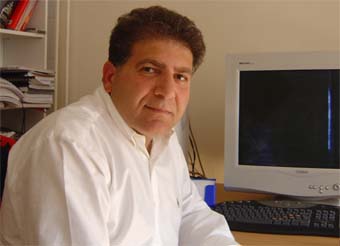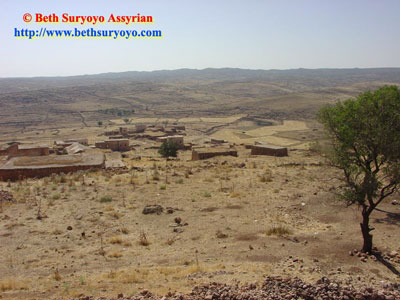|
STONE VILLAGE
I tell him that I will visit his native region Tur Abdin next spring. Sabri Atman looks up. ‘Bring me a stone from my village,’ he says. We are sitting on the small terrace of the flat that he rents in Enschede. It is autumn. He closes his eyes at the glow that shines in his face: sadness frozen in low sunlight. August Thiry
 Sabri Atman
Sabri Atman is now a man in his forties, living in Enschede in the Netherlands. He was forced to leave Turkey many years ago and he has never returned to his native village Arbo, as it is called in Turoyo, the Neo-Aramaic idiom of the Christian minority in Tur Abdin. Sabri was born there in 1962.
In those days Arbo was known in the region as ‘the village of thieves’. There were two important family clans and they both used to steal sheep or goats whenever they could. ‘Just like our Kurdish neighbours did,’ says Sabri. His home was close to Mor Shalito, the main church in the centre of the village. Arbo counted about fifty houses. ‘There were four hundred souls, all Christian people,’ says Sabri. ‘Our priest, qasha Efrem, lived in the neighbouring village of Harabale. He intervened when people from Arbo quarrelled among each other, he put an end to these feuds and every Sunday he came to Arbo to say Mass.’ Just before the Sunday service the villagers gathered at the church and shared their homemade bread with the poorer ones. ‘Don’t get me wrong. We were all needy people. We could only rely on ourselves. And on God.’
There is something else he remembers quite well: the grapes of Arbo. ‘People made wine from these grapes. Red wine it was. I was too young to be allowed to try it, but I did so anyway. It tasted like heaven.’ Gavur boy
Arbo was his first world. Sabri was eight or nine years old when his father sent him to western Turkey for better education. He went together with the first Turkish schoolmaster who had come to Arbo to teach in the primary school that had been opened in the village. Sabri stayed almost a year in the house of the schoolmaster’s parents in Adapazari, a town east of Istanbul. Very soon Sabri experienced what being different really meant.
‘The people of Adapazari were old-fashioned Muslims, ignorant folk in fact. I was a Christian non-believer, the first gavur they had ever seen. When I had just arrived, many of them came to the house to look at me, as if I were a creature from another planet. Later on they took me to a nasty place. Come, they said, we will bring you to your ancestors. It was an old graveyard. I was young, I asked if there were other Christians like me in that area. They all laughed. Not anymore, you gavur-boy, they said, our own grandfathers killed them all a long time ago. Only afterwards I found out that it were Armenian graves. And I began to realize what had happened in 1915 during the genocide against the Armenians all over Turkey and against my own people, the Aramaic speaking Christians of Tur Abdin.’
Then his father came and took him back home. His father was a farmer, he grew wheat and grapes and tomatoes, but that was hardly sufficient to feed the family. Sabro was the second of eight children and he remembers that hungry feeling in his body when he was a small boy who came home from the primary school in Arbo. ‘Now I know how hard it must have been for my parents to send their children to bed without any food.’ Things got even worse when he returned to the village. That year it didn’t rain, the harvest was bad and there was not enough drinking water. Survival became the real priority. Many villagers left Arbo and Sabri went with his family to Midyat, once a predominantly Christian place and the only small town in the Tur Abdin region. ‘It was not that far from Arbo,’ says Sabri. ‘My father found a job there as a construction worker and his boss was a Christian. It could have been worse.’
Sabri attended the Turkish junior high school in Midyat. It were the seventies and also in Turkey the struggle between left and right tendencies polarized. ‘Some of our teachers were Kemalists, Turkish nationalists, but there were also others, progressive ones. They taught us about the rich and the poor and said that Christians and Muslims should live together in peace and unite against their real enemies, the exploiters. They gave me books. I was fourteen and I read Les Misérables from Victor Hugo and Maksim Gorki’s novel The Mother. It was as if I entered an entire new world.’
On the black list
The stones of Arbo. A clever adolescent from that tiny village picks up new stones in Midyat and puts them away, for later. Later came sooner than expected. The Atman family left Midyat and moved to Istanbul. Sabri’s parents knew that he would be a bright student and he was allowed to study at the famous Atatürk Gymnasium in the Taksim area in the centre of Istanbul.
‘There I got real problems. The headmaster was also my history teacher and one day he mentioned the Great War and spoke about Armenian dogs. I had learnt a lot about the Armenian genocide and I stood firm and said: How dare you call these people animals? They were the victims of massacres in the last days of the Ottoman Empire!
He came to me and slapped me in the face. Good Lord, I got mad with anger. I threw my bench and my chair aside. I shouted at the top of my voice that he was a fascist and that the Turkish Republic was a Nazi state. Other teachers came to see what was happening and tried to silence me. But I would not calm down. Finally the police was called in and they took me to the police station for interrogation. That must have been the first time my name was noted down on their black list.’
Sabri went back home after the incident. His parents were worried and heartbroken. ‘I was their great hope, the only son of the family who was getting higher education and who eventually would become an important man. Such were their dreams, and then all of a sudden: all hope gone. It turned out differently. Three days later, when I returned to the Atatürk Gymnasium, they wouldn’t let me in. But my fellow students organized a general strike and that was a big success, it was even supported by progressive students from other schools. At last the Gymnasium had to give in. I was admitted again and though it was hard for me to go on, I finally graduated.’
After his studies Sabri was engaged in politics in Istanbul. He became an activist and he wrote critical articles in left-wing Turkish periodicals. It didn’t last long. In 1980 the Turkish army took over all power to stop what was called the communist threat. Sabri had sensed the danger in time. Just before the military coup d’état took place, he emigrated from Turkey. He was then eighteen years old.
A strong voice
The rest of his life so far is the story of a political refugee in the European diaspora. Five years as an asylum seeker in Austria, but no full recognition there; then with dubious papers – a bit forged perhaps, as he calls it – to Sweden in the mid-eighties. And nowadays the low skies of Holland, Enschede. He has published three books, one in Swedish and the two others in Turkish. They deal with one burning issue: the genocide of 1915, when Armenians and Aramaic-speaking Assyrian Christians were massacred by Turks and Kurds. In Tur Abdin that terrible period is known as Seyfo, the Year of the Sword.
Sometimes I hear from him in Assyrian websites or sites about Tur Abdin on the internet. He states there that many problems of his people today are rooted in the Seyfo-period; that he has devoted himself to long-term research; that it is his duty to reveal the truth and pass it on to the younger generation. Sometimes I see him on a stand, surrounded by his people in the diaspora, when there is once again a political manifestation somewhere in Europe to commemorate 1915. He has a strong voice, his words and his gestures hold the audience in a firm grip. When, we ask, when at last will Turkey recognize the genocide against our people? He always gets applause.
Does it help? I don’t know. We are sitting together in Enschede. Sabri remembers something strange, a detail perhaps. ‘You know, I was ten when I left Arbo and I never went back. Later on in Europe it happened that almost once a week I woke up with one dream still in my head. Always the same images, like an obession. I am back in Arbo and I want to take pictures of the village, but my camera has gone. And there I am, all alone amidst the low houses, with a stone in my hand. That dream has haunted me for years. It stopped in 1995. That was the time when the last villagers left Arbo. Since then the village is dead and deserted. I cannot say that I sleep better now. I just get through the night and I don’t remember any dreams when I wake up.’
 Arbo village amidst the stones of Tur Abdin - SE Turkey
How much solitude can an exile bear abroad? How much loneliness can a political refugee from Turkey bear in Holland? Sabri Atman writes books about a forgotten genocide, he raises his voice at political meetings, he is portrayed as a tough activist on internet and his name must be notorious in the Turkish embassies of capital cities in Europe. It is not enough. I see him back in Arbo, many years ago. The other boys have thrown their stones and left the scene. For them the game has been played. But not for him: he is still standing firm there; alone, with a stone in his hand.
|

 Diaspora
Diaspora  Atman and Arbo
Atman and Arbo

 Diaspora
Diaspora  Atman and Arbo
Atman and Arbo